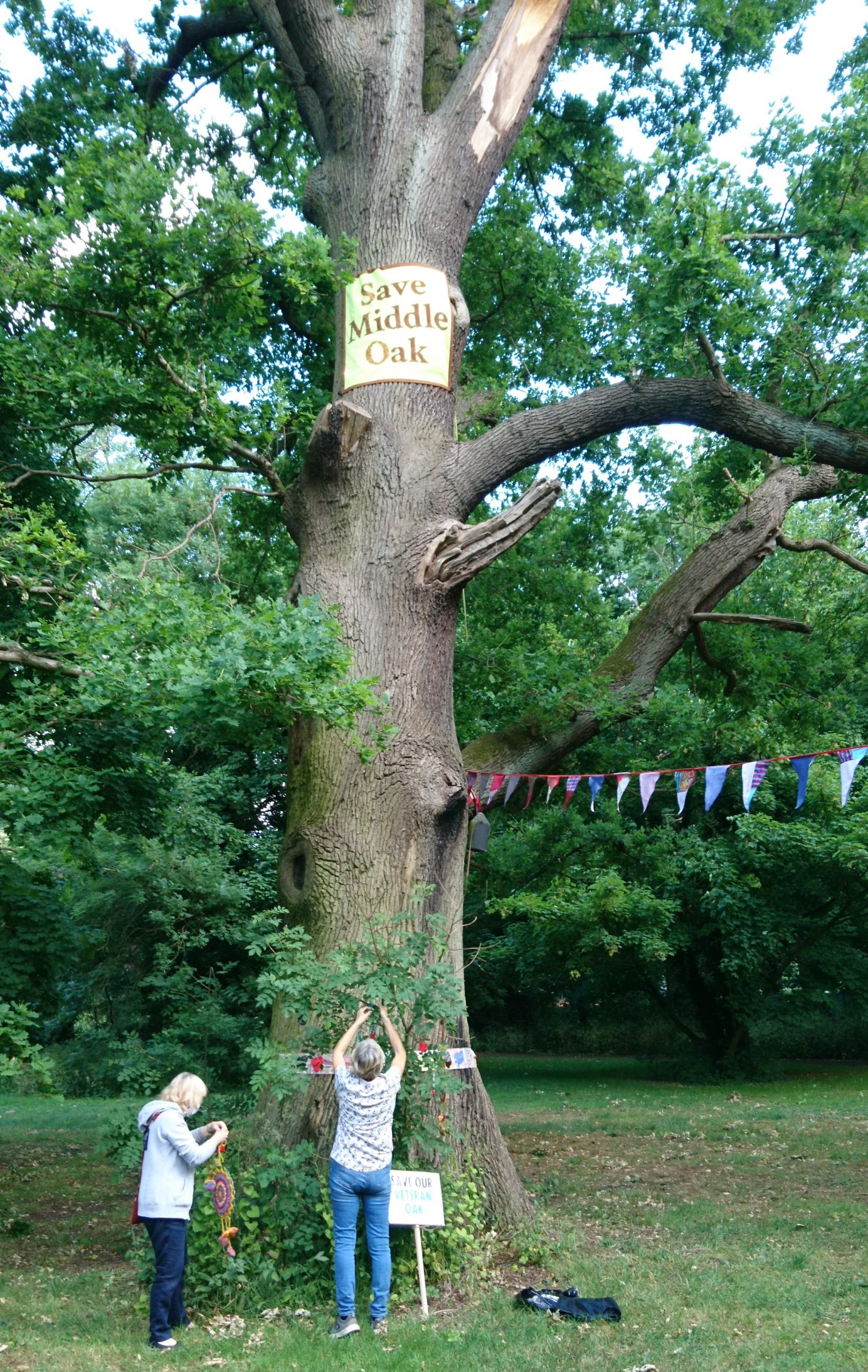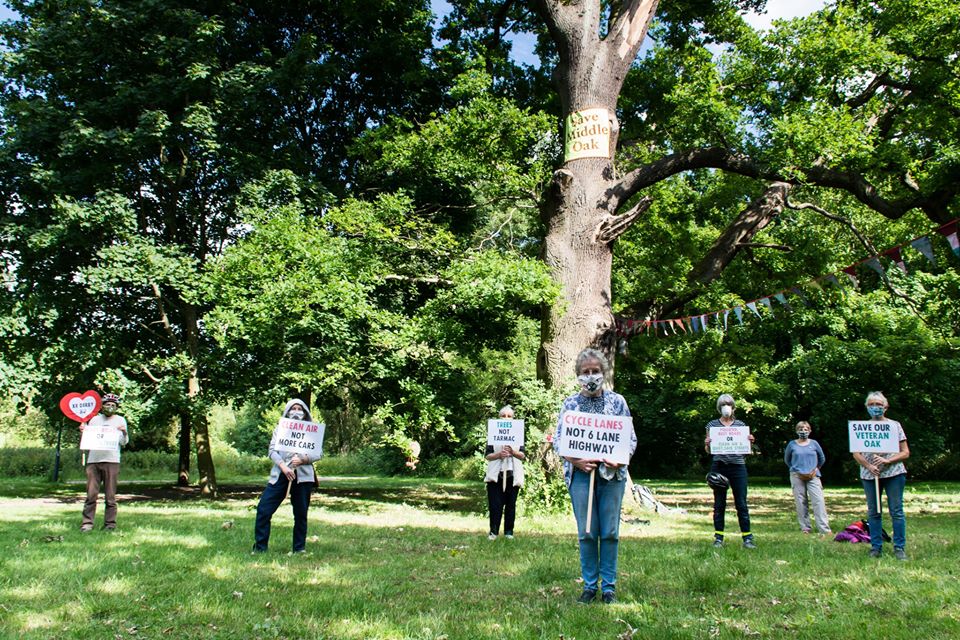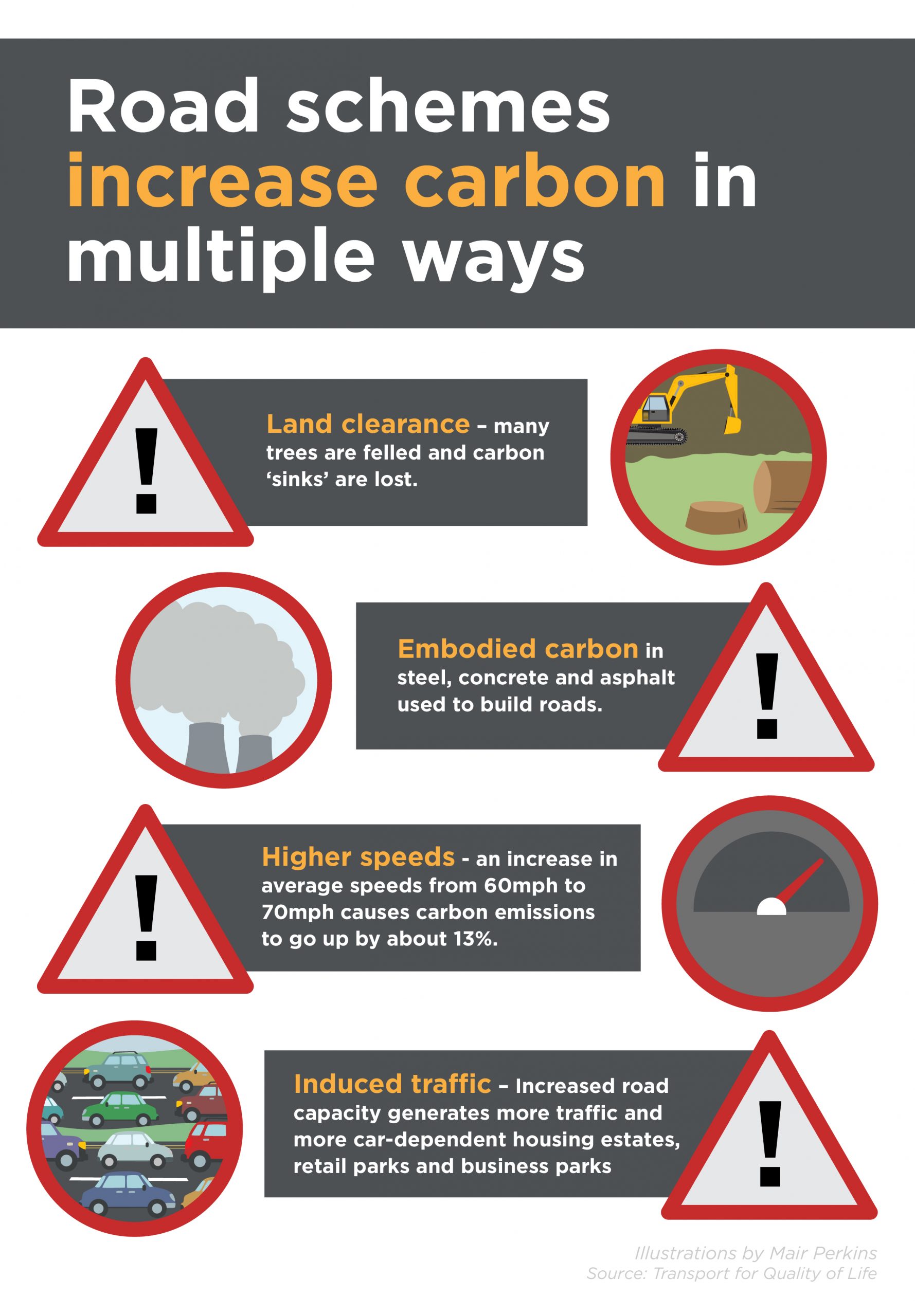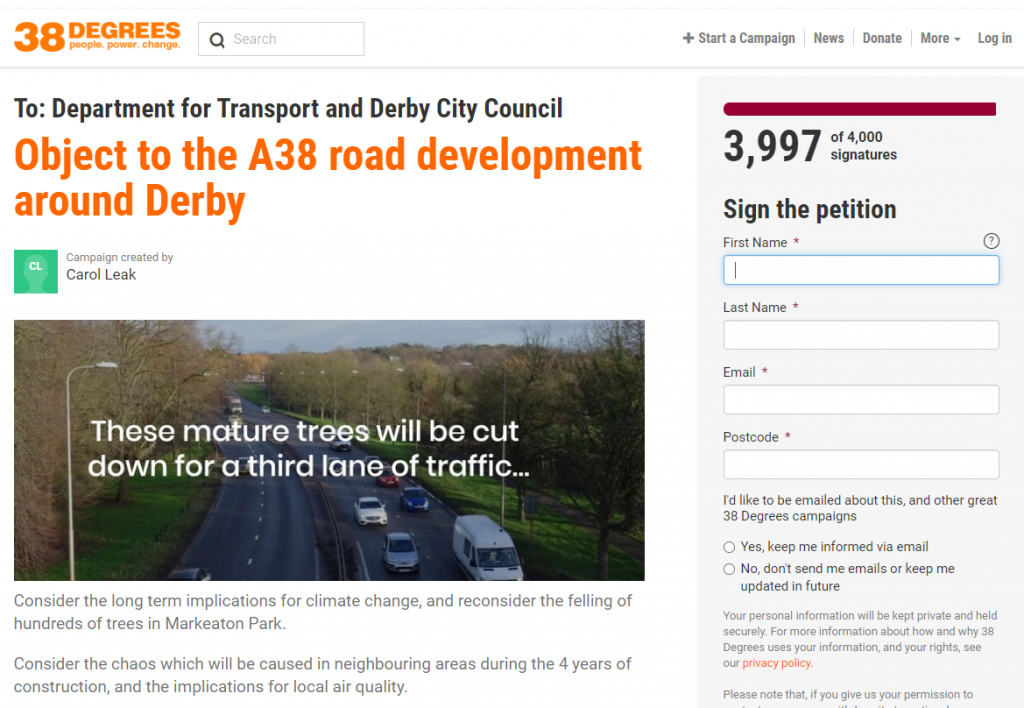We cannot continue to build roads as the answer to congestion. Stop road building projects like the A38 junctions.
- Join the WhatsApp Group Chat.
- Click “Going”, share the Facebook event and invite your friends.
COVID-19 SAFETY: If supporting in person, please wear a face covering, sanitise your hands regularly and stay 2 metres apart from anyone outside of your household or support bubble. Please also be mindful to not obstruct any pedestrian / cycle paths and give space to members of the public. If you have any COVID-19 symptoms or are in an at risk group, please stay at home. Scroll down to see how you can help from home.
TIMES & ACTIVITY
Watch this space for more actions coming up

TREE DECORATING: Bring beautiful, hand made placards and signs. Be creative but if you’re looking for inspiration see suggested slogans below. You can hold the sign throughout the action or tie it to a tree with string. Bring things to decorate the trees with such as bunting, balls of string/yarn, ribbon, strips of fabric (6 feet – 15 feet) and hanging decorations. Please be mindful to avoid decorations that could harm the trees or wildlife or blow into the road and harm drivers.
OUTREACH: There will also be a team talking to people about the trees and road works throughout the afternoon. Anyone is welcome to join this team on the day.
MUSIC: XR Derby’s band that plays samba inspired music with drums will also be there! Bring a percussion instrument if you’d like to join in. This could be a homemade shaker made of dry rice/pasta/lentils/seeds etc. in a jar/container.
SOCIAL MEDIA: Share any photos from the day using hashtags #savethetrees #stopa38works #stopRIS2 #climateemergency , tag @xrderby and share the petition: https://you.38degrees.org.uk/petitions/object-to-the-a38-road-development-around-derby-1
LITTER PICKING: While we’re there trying to save the trees, we can also help our city’s green spaces stay tidy. So if you can pick up any litter, that would be amazing! Just bring gloves or a litter picker and a bag to store any litter in.
This action aims to be safe, peaceful, family-friendly and welcoming to all. If you have any questions, please feel free to message us or join the Trees not Tarmac WhatsApp group.
SUGGESTIONS FOR WHAT TO PACK
- Beautiful placards and signs – Get creative but if you’re looking for inspiration see suggested slogans below.
- Things to decorate the trees with such as bunting, balls of string/yarn, ribbon, strips of fabric (6 feet – 15 feet) and hanging decorations. Please be mindful to avoid decorations that could harm the trees or wildlife or blow into the road and harm drivers.
- Musical instruments. This could be a homemade shaker made of dry rice/pasta/lentils/seeds etc. in a jar/container.
- Something to sit on if you’d prefer not to sit on the grass
- Pavement chalk
- Water and snacks
- Sun protection
- A rain coat / umbrella
- Hand sanitiser
- A face covering
Take action from home:
- Write to your councillors and MP about the A38 works. Here’s a template letter to help.
- Sign and share the petition.
- Support the legal challenge against the Department for Transport for Road Investment Strategy 2 (RIS2) which the A38 junctions scheme is part of:
- Complete the Department for Transport’s consultation on their decarbonisation plan. Transport Action Network has some guidance on what to write.
- Have conversations with to your friends, family, colleagues and neighbours about the climate emergency, the need to stop road building and need to reduce the number of vehicles on roads.
- Share social media posts about this campaign. Check our Facebook, Twitter and Instagram.
- If you are part of a local organisation or community group you can join the coalition that is opposing the A38 works. Contact media@rebellionderby.earth
- Support these other campaigns for better transport.

Suggested slogans for home made banners and placards.
For more inspiration, scroll down to read about why we are doing this and what we want to achieve.
- Stop the A38 road works
- Save the trees
- Trees not tarmac
- Save two minutes on a car journey?…or save our futures?
- This is a climate emergency. No more road building!
- Save the trees – Stop the A38 works
- Trees absorb CO2, give us oxygen and give homes to wildlife. Let them live!
- Save our trees! No more roads
- When the last tree has been cut down, the last fish caught, the last river poisoned, only then will we realize that one cannot eat money.
- In a climate emergency you don’t cut down trees to make space for more cars
- We want clean air, green spaces and less cars on the road
- A38 works = 4 years of disruption, more pollution and £250 million wasted
- Pollution is killing us!
- Air pollution = ecocide
- Mo’ roads ‘Mo problems
- BIGGER ROADS = MORE TRAFFIC = MORE AIR POLLUTION

WHY WE ARE DOING THIS
Derby City Council admitted in an Air Quality Report that these road works will increase deadly air pollution in Derby City during the construction. These road works are harmful to public health, ignore the climate emergency by increasing carbon emissions and worsen the UK’s nature crisis by felling trees and destroying wildlife habitats.
The veteran oak tree near Markeaton Park’s curly bridge is just one of many trees which will be cut down if the planned £250 million A38 road works go ahead.
The planned A38 works in Derby are part of the thousands of miles of roads from Cornwall to Northumberland that the Government is spending £90 billion on. The roads programme will stoke climate change and worsen air pollution, without cutting congestion. Let’s invest in healthcare, broadband and sustainable transport instead, and redouble our efforts to cut carbon emissions and restore the natural world.
There’s hope these destructive, costly and climate emergency defying road projects will be stopped. The Department for Transport is being challenged in court over these costly and ecologically destructive road schemes.
- Learn more about the A38 works at a38derbychaos.org
- Sign the petition to stop the A38 works.
- Read a report on the carbon impact of road building.
- Support Transport action Network’s legal challenge.
We have been trying to get these messages across to Derby City Council, the Department for Transport and Highways England through their proper channels. But our concerns and presentations of evidence have been repeatedly dismissed and ignored – despite the potential catastrophic consequences and loss of life for inaction on CO2 emissions and air pollution. So we have been left with no choice but to hold demonstrations and run our own campaigns. When authorities fail to protect their citizens and put economic interests over public health, we have a duty to stand up and do what is right.
We want to get the message across that we’re in a climate and ecological emergency and felling trees to make space for more cars is wrong. We must be reducing the number of vehicles on the roads if we want a safe, habitable planet in the future.
We are not saying there should be no road vehicles. Some people are dependent on their cars for mobility and aren’t able to access alternative transport. But if we encourage the majority of road users to use alternative transport or minimise the need to travel, the resulting reduction in road vehicles would also improve driving conditions for those who are car dependent.
The billions being spent on building roads should be invested in active travel and public transport to make it cheaper (or free!), safer and more accessible. Public transport needs to be improved to make it safe for women and marginalised groups who face high rates of hate crime and harassment on public transport. Those who can afford a car do so partly because car use feels safer than public transport.
We all know that trees play a huge role in tackling the climate crisis. Trees help regulate the local climate, produce oxygen, improve soil quality, attract wildlife, and absorb CO2! A young tree absorbs about 5.9KG CO2 per year, while a 10 year old tree absorbs almost 22KG per year (Source). Mature trees are better for wildlife than young saplings too. Mature oak trees support more life than any other native tree species in the UK; even fallen oak leaves support biodiversity (Source). Replacing these mature trees with saplings is inadequate. We need let the mature trees live, plant saplings in appropriate places and reduce road traffic.
These road-works are planned because the A38 junctions are too congested. But building more roads is not the solution. When more roads are built, they are just filled with more vehicles – this is called induced traffic. The M25 is an excellent example of induced traffic
The UK can minimise the use of road vehicles, through investments in public transport, good urban design and encouraging people to cycle and walk as much as possible. The need for journeys can be reduced by improving broadband for video conferencing and employers allowing home working for those who can.
Reducing road vehicles will also improve air quality in Derby. Derby air pollution is well over safe limits in many areas. Air pollution – caused mostly by road traffic – is one of the UK’s biggest killers, and is responsible for an estimated 36,000 premature deaths per year. Derby City Council states that air pollution kills about 131 people in Derby each year. Like most crises, it’s the poorest and most vulnerable who suffer most from pollution.
Derby City Council also stated on page 12 of this air quality report that the A38 works will increase air pollution during the 4 years of construction as traffic diverts throughout the city. Yet the council still supports the scheme despite the acknowledgement that about 131 people die each year in Derby due to air pollution.
So far the Council has tried to tackle air pollution by allowing cars to move more easily as idling traffic allows more build up of dirty air. But the vehicles are still releasing air pollution and CO2. It’s just less concentrated. To seriously tackle air pollution and protect public health, we need less cars on the roads and to introduce clean air zones throughout the city. Deaths from air pollution is tragic, unacceptable and avoidable. These deaths and many illness could be prevented if everyone just used road vehicles for essential journeys when there are no other transport options.
Reducing road vehicles will also create safer conditions for pedestrians and cyclists. One of the small silver linings of the tragic COVID-19 outbreak and lockdown was that we were able to experience what the world could be like with fewer cars on the roads. Cycling rose by an average of 78% during the course of the lockdown.
Derby City Council and the Department for Transport recognise there is climate emergency and transport needs to decarbonise. Yet this outdated road scheme is still going ahead. If we want to avoid catastrophic global temperature rises and loss of billions of lives, we need to urgently cut green-house gas emissions. That means reducing road traffic and halting all road building projects.
Derby’s CO2 levels must reduce immediately by 13% annually to stay on track for net zero carbon emissions by 2050. Road transport is the second biggest contributor of CO2 in Derby City. At the current emission rates, Derby will blow its entire carbon budget in less than five years (Source).
Added to this, the proposed A38 junction roadworks will add 131,000 tonnes CO2 over its three-four year construction period and an extra 29,000 tonnes CO2 over the period 2024-2039 due to induced traffic (Source).
The Government’s clean car revolution will not happen fast enough to prevent emissions breaching climate laws.
We urge Derby City Council to take the following actions:
- Derby City Council to officially oppose the A38 works and cease cooperation with Highways England.
- To grant Tree Protection orders to all the trees that are under threat from the A38 works.
- To develop a Derby air quality plan with a priority on road vehicle reduction.
- To develop and implement a net zero by 2025 road transport emission reduction plan for Derby.
- To run a transport behaviour change campaign in Derby city. Inform people of the dangers of the climate emergency and air pollution and why urgent transport changes are needed.

